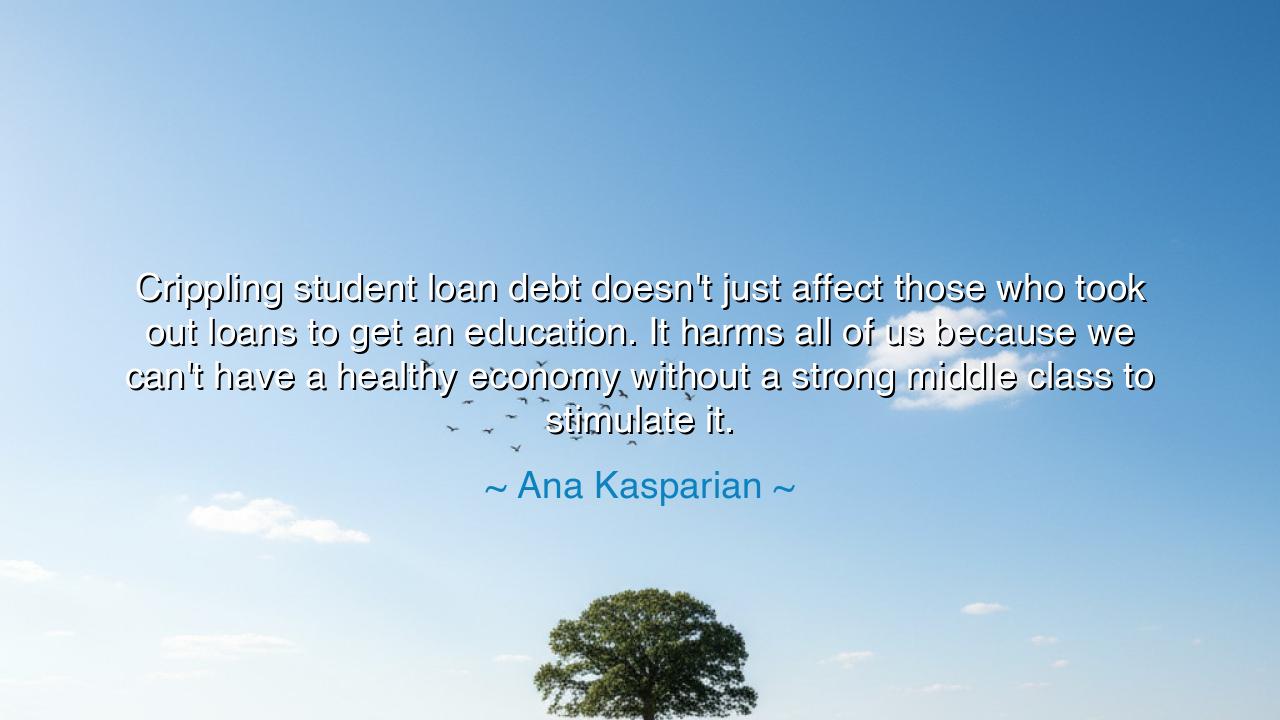
Crippling student loan debt doesn't just affect those who took
Crippling student loan debt doesn't just affect those who took out loans to get an education. It harms all of us because we can't have a healthy economy without a strong middle class to stimulate it.






Hear, O seekers of wisdom, the cry of Ana Kasparian, who spoke with fire in her voice: “Crippling student loan debt doesn’t just affect those who took out loans to get an education. It harms all of us because we can’t have a healthy economy without a strong middle class to stimulate it.” These words are not mere utterances of complaint, but the lament of a generation bound by chains not forged of iron, but of contracts, interest rates, and unyielding obligations. In them, she speaks not only for the indebted, but for the whole body of the nation, which suffers when its limbs are shackled.
The ancients knew this truth well, though they clothed it in different garments. In Rome, when the common citizens fell into debt, many were forced into bondage, sold into servitude to pay what they could not give in coin. The Senate would speak of lofty ideals, but the voices of the plebeians thundered: “How can Rome be strong when her people are enslaved by debt?” And so it is today, though the chains are invisible and the prison is paperwork. When the young, fresh with learning and eager to labor, are trapped by unpayable sums, the strength of the whole economy falters.
Consider the tale of the Great Depression of the 1930s. Though not born of student debt, it revealed the same eternal principle: when the middle class collapses, the engine of prosperity halts. Without families able to buy, without workers able to spend, without households able to dream, the markets crumble. Nations do not thrive on the wealth of kings and merchants alone, but on the heartbeat of the many—the shopkeepers, the teachers, the builders, the healers. When their breath is stifled, the whole nation gasps. Kasparian’s words are a reminder that the fate of the individual is bound to the fate of all.
Her lament is also a warning to those who think debt is only a personal failing. She speaks against the illusion that one man’s burden is his alone. In truth, when millions are bent beneath the weight of student loans, they cannot buy homes, they cannot start families, they cannot create businesses. The merchants have fewer customers, the builders fewer buyers, the cities fewer taxpayers. The wound of the few becomes an infection in the whole body. Thus, the pain of one generation becomes the weakness of the nation itself.
But let us not despair. For Kasparian’s cry is not simply a dirge—it is a call to action. Just as the Romans of old reformed their laws to free citizens from eternal bondage, so too must we seek policies that uplift rather than enslave. Forgiveness of debt, fair wages, affordable education—these are not luxuries, but necessities for the survival of a just and prosperous society. Without them, the tree of the nation withers; with them, it grows strong and shelters all.
The lesson is clear, O children of tomorrow: do not look upon the struggles of your neighbors as distant from your own. When your brother is crushed by debt, you too are weakened. When your sister cannot rise, your community stumbles. Lift together, or fall together—that is the eternal law. The health of the whole depends on the strength of the many, and the strength of the many depends on justice.
In your own life, let this wisdom guide you. Guard yourself from needless chains, yet show mercy to those already bound. Support leaders and movements that fight for fairness in education and opportunity. Lend a hand to those who stagger, and raise your voice when systems grow cruel. Remember that prosperity is not built by isolating oneself, but by building a society where all can breathe, work, and flourish.
Thus, take Kasparian’s words as both shield and torch: a shield against the ignorance that says “it is not my concern,” and a torch to light the path toward a future where the middle class is not broken, but strong—where debt is not a prison, but education is a ladder, and where the rising of one becomes the rising of all. For only then shall the economy, and the people it serves, truly live in strength and dignity.






AAdministratorAdministrator
Welcome, honored guests. Please leave a comment, we will respond soon